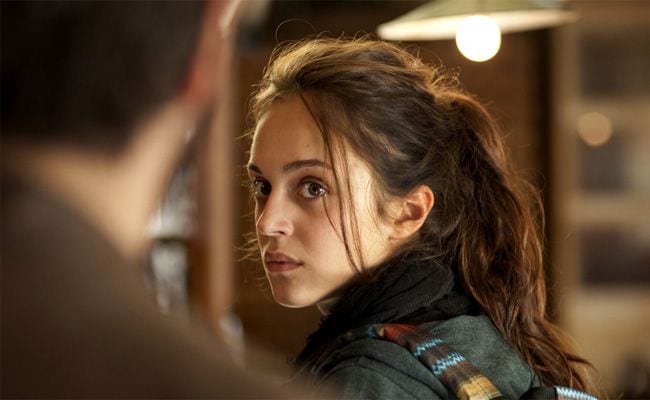
“Do you hear yourself? You can’t say whatever you want and then apologize.” Marie-Ann (Bérénice Bejo) turns to look at Samir (Tahar Rahim), her fiancé. He lies on his bed, gazing at the ceiling, their separate frames and seemingly different spaces indications of their dislocation from one another. They’re talking about his wife Céline (Aleksandra Klebanska), currently comatose in a hospital following a suicide attempt, wondering whether the new scratches on her stomach are reactions to his visits or “involuntary”.
The question leads inevitably to their relationship, once secret and now, suddenly and rather violently, revealed. Marie and Samir are sorting out how to live with each other and the several children they have from different relationships, as well as Marie’s current pregnancy, and oh yes, her ex, Ahmad (Ali Mosaffa), just arrived in Paris from Iran in order to sign divorce papers. It’s a complex arrangement of individuals and needs, fears and desires, one that at the start of The Past (Le Passé), is shaped by any number of reactions, voluntary and involuntary.
These reactions are increasingly complicated, as assumptions about the present — yours and the characters’ — give way to changing perceptions of the past. It’s a process reflected in the movie’s many doorways and windows, framing conversations and confrontations, efforts to connect and also to break away. Asghar Farhadi’s film opens as Ahmad arrives at the airport, separated from Marie as she comes to fetch him; they gesture and speak across an expanse divided by glass walls, their frustrated expressions suggesting their familiarity but also their distance. It’s been years since Ahmad left France, but their shared past is hardly over. As soon as they get into the car, they’re arguing over what might have happened, what they remember happening. As Samir notes later, “When two people meet four years later and start fighting again, it means things are unresolved.”
Ahmad’s appearance triggers concerns about many such “things”, and not only for Marie and Samir. The disruption he poses first emerges in debates about where he’ll stay, whether at a hotel or at Marie’s, which leads to immediate questions about where Samir will stay, with his young son Fouad (Elyes Aguis). The boy prefers the security he’s learned to expect at Marie’s home in the suburbs, as opposed to the chaotic urban apartment shared by his mother and father; that Marie hasn’t set all this up before Ahmad’s arrival suggests her own irresolution, underlined by a series of doorways and hallways that put her, the two men, and the children, in separate frames, guessing at each other’s reactions, leaving questions unanswered.
It hardly seems a coincidence that it is Marie’s teenaged daughter Lucie (Pauline Burlet), who voices much of this turmoil. While her mom might be distracted by work, Lucie is at home with one man and then another. Missing the stability she remembers feeling with Ahmad, she suggests that Marie has chosen Samir because he resembles Ahmad, and then, when Ahmad asks her to explain what’s troubling her, she reveals what seems obvious, that she’s afraid her mother “will live with [Samir] for a while and then he’ll leave.”
But this is only a first step in learning what worries Lucie, trying to negotiate her feelings for her mother, her absent father (he’s moved back to Brussels) and the two men in front of her. And so Ahmad becomes something of a detective in uncovering bits of the past, the circumstances of Samir and Marie’s meeting and courtship, the living situations for the kids, the details of Céline’s condition. Even as they’re all interconnected, none of these storylines is quite coherent.
This becomes especially visible in the children’s reactions. Lucie struggles with what she knows or doesn’t know about her mother’s new relationship, and her brief disappearance sending Ahmad and Samir out into the night on a search of the streets, riding in Marie’s car and doing their best to focus on Lucie while confused about their roles. More acutely, little Fouad acts out his own fraught reaction to the loss of his mother. Resisting his dad’s instruction to visit her at the hospital, the boy remains behind on the metro, as Samir heads to the platform, then races back to the car, just before it leaves the station. Samir’s panicky response only exacerbates Fouad’s fears, which he finally expresses, pressed up against the metro wall, his face pale and his eyes wide: “She scares me, she’s dead.”
In fact, as Samir tries to explain, she’s hooked up to machines, and as unresponsive as she might appear to her son, the doctors have yet to decide to turn off the machines. Céline is between states, and as such, a vivid if inert embodiment of the dilemma facing everyone in The Past. That she doesn’t actually appear on screen until the film’s final scene makes Céline at once inscrutable and remote, but also utterly material, a sign of irreversible if receding history.


![Call for Papers: All Things Reconsidered [MUSIC] May-August 2024](https://www.popmatters.com/wp-content/uploads/2024/04/all-things-reconsidered-call-music-may-2024-720x380.jpg)



